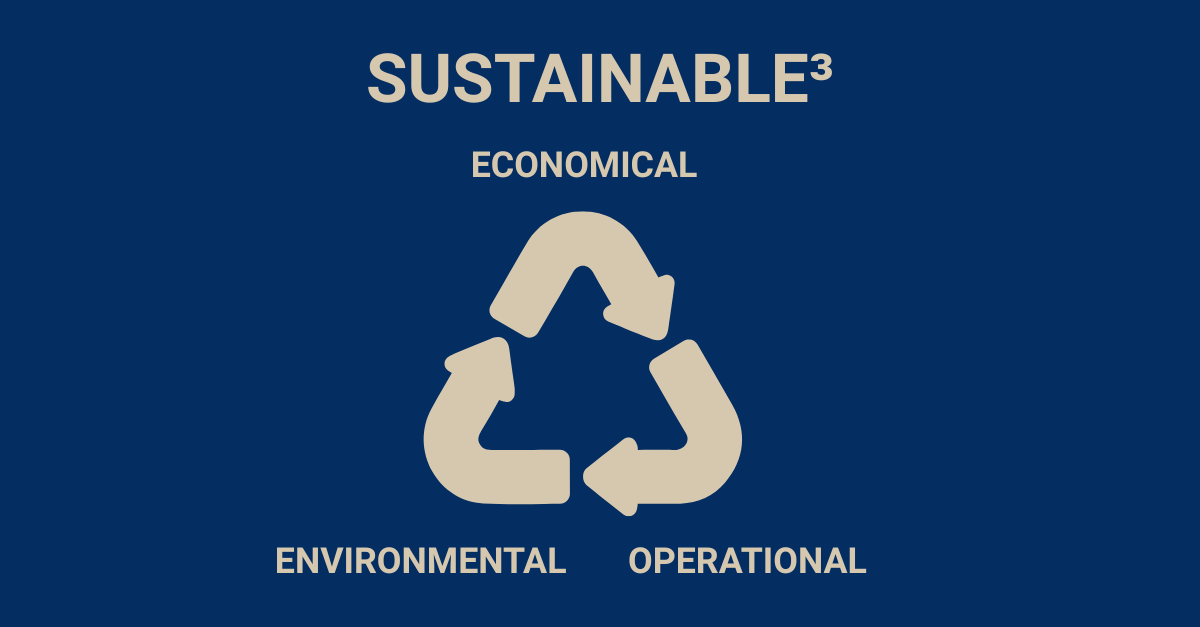Sustainable Waste Management Solutions - Sustainable³
Waste Optima’s Sustainable³ framework is a three-pillar approach to industrial recycling—economic, operational, and environmental. It ensures programs lower landfill and hauling costs, are simple for plant teams to run, and deliver measurable landfill diversion, CO₂e reduction, and ESG reporting support for manufacturers and warehouses.
What Is Sustainable³
Waste Optima’s Sustainable³ framework is our approach to designing industrial recycling programs that are:
Economically viable
Operationally simple
Environmentally responsible
By focusing on these three pillars, we help ensure your recycling initiatives deliver long-term value, fit smoothly into plant operations, and contribute to a healthier planet.
Economically Sustainable Recycling
Evaluate waste hauling vs. recycling costs to target cost parity or savings.
Identify recyclable streams that can generate rebates or offset disposal fees.
Design programs that stay within your budget without sacrificing performance.
Operationally Sustainable Recycling
Implement simple sorting protocols with clear signage to minimize training.
Place collection containers near production areas to reduce movement and labor.
Set consistent pickup schedules and support so plants can keep running smoothly.
Environmentally Sustainable by Design
Reduce landfill volumes by diverting as much material as practical.
Decrease your facility’s carbon footprint through recycling and reuse.
Support a circular economy by returning materials back into production cycles.
How We Apply Sustainable³
Begin with a waste audit and material assessment for each site.
Propose tailored solutions that balance cost, ease of implementation, and environmental benefit.
Leverage a nationwide network of recyclers, reprocessors, and reuse partners.
Provide diversion reports so you can track financial savings and environmental impact.
Ready to Build a Sustainable Program
Contact us to design a Sustainable³ recycling solution for your facility, or explore our Industrial Solutions Overview to see how the framework applies to plastics, paper, chemicals and sludges, heavy industrial byproducts, organics, and surplus inventory.
FAQs
Q1. What is Sustainable³?
Sustainable³ is Waste Optima’s three-pillar framework for industrial recycling programs that are economically viable, operationally simple, and environmentally responsible. It aligns recycling decisions with your budget, plant workflows, and sustainability goals.
Q2. How is Sustainable³ different from typical recycling programs?
Many recycling efforts start with environmental goals and then struggle with cost or implementation. Sustainable³ starts with economics and day-to-day operations first, so programs save money or stay cost-neutral and are easy for plant teams to run—making the environmental benefits more durable.
Q3. What types of companies is Sustainable³ designed for?
The framework is built for manufacturers, warehouses, and industrial facilities that generate recurring waste and byproduct streams—across plastics, paper, chemicals and sludges, organics, heavy industrial byproducts, and surplus inventory.
Q4. How does Sustainable³ show up in day-to-day plant operations?
In practice, Sustainable³ looks like simple sorting rules, containers placed where work actually happens, reliable pickup schedules, and clear diversion reporting. The goal is to make recycling the path of least resistance on the plant floor.
Q5. How do I know if my program meets the three pillars?
We typically start with a waste assessment: reviewing current disposal costs, site logistics, materials, and outlets. From there, we identify where your program is already strong and where adjustments to economics, operations, or environmental outcomes would provide the most benefit.
Q6. Can Sustainable³ support ESG and Scope 3 reporting?
Yes. Because Sustainable³ programs include documented tonnage, material types, and outlet categories, they can support ESG disclosures, Scope 3 reporting, and internal sustainability targets around landfill diversion and CO₂e reductions.
Last updated: 2025-11-03

